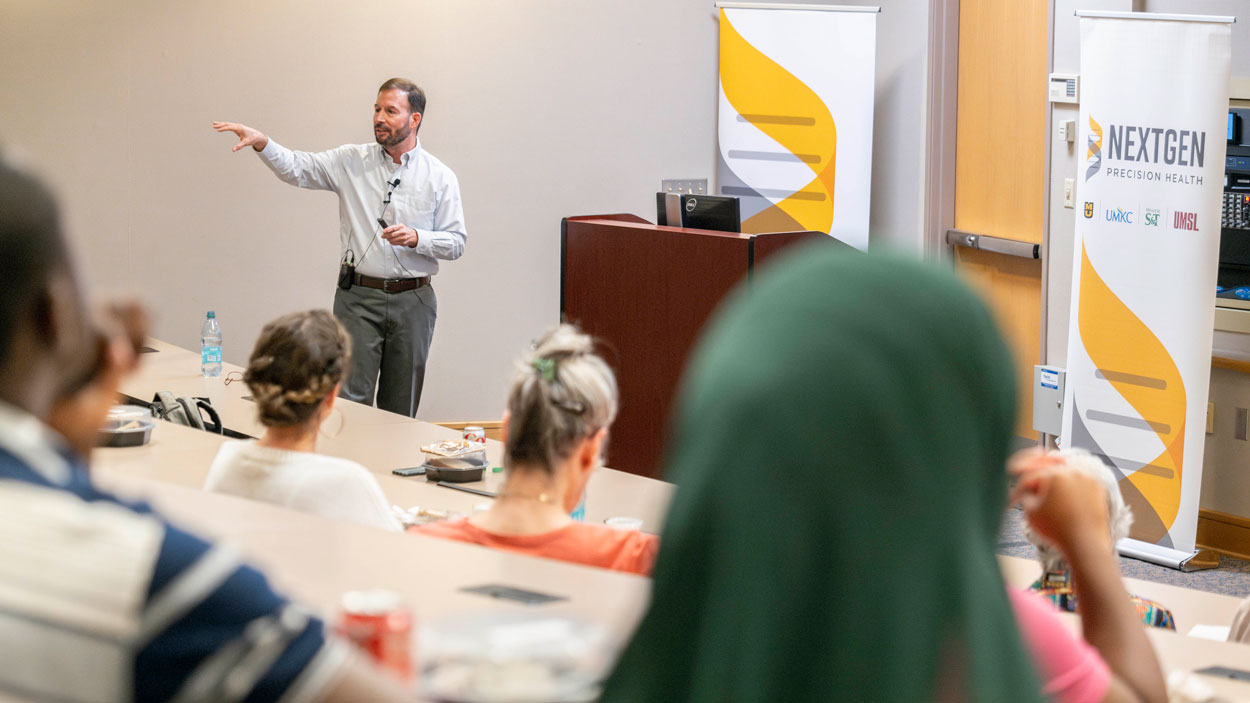
Professor Michael Nichols discusses his Alzheimer’s research during a talk last Wednesday as part of the NextGen Precision Health Discovery Series. (Photo by Derik Holtmann)
Nearly 7 million people are living with Alzheimer’s disease across the United States, and that figure is expected to increase to nearly 13 million by 2050.
It is already the fifth-leading cause of death for Americans 65 and older, according to 2021 statistics from the Alzheimer’s Association.
The disease doesn’t just impact the lives of those afflicted. More than 11 million Americans have reported caring for a friend or loved one living with the disease.
It’s no wonder that the scientific community is so invested in finding a way to cure the disease or mitigate its impact. There are clearly genetic factors at play in determining who will develop Alzheimer’s, but no one has yet identified the precise causes for the disease.
Michael Nichols, a professor of chemistry and biochemistry at the University of Missouri–St. Louis, is among the legion of researchers working to find that answer. He was the featured speaker last Wednesday afternoon for the latest installment of the University of Missouri System’s NextGen Precision Health Discovery Series.
“I think most of us have had some interaction – most likely a family member, but it could be a friend or a colleague that has suffered from Alzheimer’s disease,” Nichols said as he opened his nearly hourlong talk in front of a few dozen people in the Chamber in the Millennium Student Center.
Even more people were tuning in online via Zoom as Nichols provided an overview of Alzheimer’s, including the combination of plaques and tangles in the brain associated with its pathology.
“It is the most common form of dementia,” he said. “There are ways to distinguish between Alzheimer’s disease and other forms of dementia, which may be more readily treatable. It involves personality changes, behavioral changes and difficulty with normal life. Down at the level of the neurons, there’s a substantial loss of neurons, and the brain shrinks dramatically, and ultimately the disease is fatal.”
Nichols has been doing research into Alzheimer’s – specifically the inflammation in the brain associated with the disease – for more than two decades, beginning with his time as a postdoctoral fellow at the Mayo Clinic in Jacksonville, Florida. It’s been a central part of his work since he arrived at UMSL in 2004.
He understands better than most how slow progress has been in that time, but he was glad to share some updates on the development of new diagnostics and therapeutics to combat the disease.
“Up until about three years ago, everything was a non-disease-modifying therapeutic,” Nichols said. “So, these are things that kind of address the symptoms. They’ll maintain acetylcholine levels. They don’t really stop or slow the disease, or they’ll block dysregulation of calcium. They’re good medicines. They can buy some time, but they don’t directly address the disease itself.”
That changed about three years ago when the FDA began approving some antibody-based therapeutics. In clinical trials, two of the treatments have been shown to modestly slow cognitive decline associated with Alzheimer’s.
“We’re not quite there yet, and it’s obviously going to take a lot of other things – and it may require multiple types of medications instead of just finding one particular target – but this is all good, promising information and we’re starting to make some headway,” Nichols said. “Believe me, everyone is learning from everyone else.”
Nichols spent the latter half of his lecture giving a more in-depth description of the work his lab is doing on the amyloid-β protein, which is the first protein that builds up in the brain before the development of Alzheimer’s. Nichols has been studying how the amyloid-β protein interacts with a group of three proteins known as NLRP3 inflammasome to cause inflammation inside immune cells in the brain. Last fall, Nichols received a $459,279 grant the National Institute of General Medical Sciences, part of the National Institutes of Health, to support his research.
Watch Nichols’ presentation:














